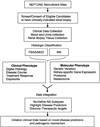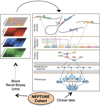Design of the Nephrotic Syndrome Study Network (NEPTUNE) to evaluate primary glomerular nephropathy by a multidisciplinary approach - PubMed (original) (raw)
Multicenter Study
doi: 10.1038/ki.2012.428. Epub 2013 Jan 16.
Debbie S Gipson, Lawrence B Holzman, Akinlolu O Ojo, Peter X K Song, Laura Barisoni, Matthew G Sampson, Jeffrey B Kopp, Kevin V Lemley, Peter J Nelson, Chrysta C Lienczewski, Sharon G Adler, Gerald B Appel, Daniel C Cattran, Michael J Choi, Gabriel Contreras, Katherine M Dell, Fernando C Fervenza, Keisha L Gibson, Larry A Greenbaum, Joel D Hernandez, Stephen M Hewitt, Sangeeta R Hingorani, Michelle Hladunewich, Marie C Hogan, Susan L Hogan, Frederick J Kaskel, John C Lieske, Kevin E C Meyers, Patrick H Nachman, Cynthia C Nast, Alicia M Neu, Heather N Reich, John R Sedor, Christine B Sethna, Howard Trachtman, Katherine R Tuttle, Olga Zhdanova, Gastòn E Zilleruelo, Matthias Kretzler
Affiliations
- PMID: 23325076
- PMCID: PMC3612359
- DOI: 10.1038/ki.2012.428
Multicenter Study
Design of the Nephrotic Syndrome Study Network (NEPTUNE) to evaluate primary glomerular nephropathy by a multidisciplinary approach
Crystal A Gadegbeku et al. Kidney Int. 2013 Apr.
Abstract
The Nephrotic Syndrome Study Network (NEPTUNE) is a North American multicenter collaborative consortium established to develop a translational research infrastructure for nephrotic syndrome. This includes a longitudinal observational cohort study, a pilot and ancillary study program, a training program, and a patient contact registry. NEPTUNE will enroll 450 adults and children with minimal change disease, focal segmental glomerulosclerosis, and membranous nephropathy for detailed clinical, histopathological, and molecular phenotyping at the time of clinically indicated renal biopsy. Initial visits will include an extensive clinical history, physical examination, collection of urine, blood and renal tissue samples, and assessments of quality of life and patient-reported outcomes. Follow-up history, physical measures, urine and blood samples, and questionnaires will be obtained every 4 months in the first year and biannually, thereafter. Molecular profiles and gene expression data will be linked to phenotypic, genetic, and digitalized histological data for comprehensive analyses using systems biology approaches. Analytical strategies were designed to transform descriptive information to mechanistic disease classification for nephrotic syndrome and to identify clinical, histological, and genomic disease predictors. Thus, understanding the complexity of the disease pathogenesis will guide further investigation for targeted therapeutic strategies.
Figures
Figure 1. NEPTUNE Cohort Study Design
Figure 2. Overview of Multilevel Data Integration in NEPTUNE
“The integrative analytical approach in NEPTUNE relies on obtaining comprehensive molecular and clinical information from each subject. For molecular analysis, the initial step is to generate large-scale datasets of genome-wide genetic variation and targeted gene sequencing, compartment specific gene expression data on renal biopsy tissue, leukocytes and urine, and proteomic/metabolomic data from both urine and blood samples. Each molecular dataset will be interrogated alone and in relationship with the others in order to understand multidimensional molecular interactions. In addition, the molecular data will be analyzed with the comprehensive clinical information to determine associations between molecular events and clinical outcomes. The overall goal is to develop a framework for studies to define the molecular heterogeneity of NS for disease stratification, biomarker identification and molecular target definition. (Figure modified from Keller et al).”
Similar articles
- CureGN Study Rationale, Design, and Methods: Establishing a Large Prospective Observational Study of Glomerular Disease.
Mariani LH, Bomback AS, Canetta PA, Flessner MF, Helmuth M, Hladunewich MA, Hogan JJ, Kiryluk K, Nachman PH, Nast CC, Rheault MN, Rizk DV, Trachtman H, Wenderfer SE, Bowers C, Hill-Callahan P, Marasa M, Poulton CJ, Revell A, Vento S, Barisoni L, Cattran D, D'Agati V, Jennette JC, Klein JB, Laurin LP, Twombley K, Falk RJ, Gharavi AG, Gillespie BW, Gipson DS, Greenbaum LA, Holzman LB, Kretzler M, Robinson B, Smoyer WE, Guay-Woodford LM; CureGN Consortium. Mariani LH, et al. Am J Kidney Dis. 2019 Feb;73(2):218-229. doi: 10.1053/j.ajkd.2018.07.020. Epub 2018 Nov 9. Am J Kidney Dis. 2019. PMID: 30420158 Free PMC article. - Global glomerulosclerosis with nephrotic syndrome; the clinical importance of age adjustment.
Hommos MS, Zeng C, Liu Z, Troost JP, Rosenberg AZ, Palmer M, Kremers WK, Cornell LD, Fervenza FC, Barisoni L, Rule AD. Hommos MS, et al. Kidney Int. 2018 May;93(5):1175-1182. doi: 10.1016/j.kint.2017.09.028. Epub 2017 Dec 19. Kidney Int. 2018. PMID: 29273332 Free PMC article. - Spectrum of steroid-resistant and congenital nephrotic syndrome in children: the PodoNet registry cohort.
Trautmann A, Bodria M, Ozaltin F, Gheisari A, Melk A, Azocar M, Anarat A, Caliskan S, Emma F, Gellermann J, Oh J, Baskin E, Ksiazek J, Remuzzi G, Erdogan O, Akman S, Dusek J, Davitaia T, Özkaya O, Papachristou F, Firszt-Adamczyk A, Urasinski T, Testa S, Krmar RT, Hyla-Klekot L, Pasini A, Özcakar ZB, Sallay P, Cakar N, Galanti M, Terzic J, Aoun B, Caldas Afonso A, Szymanik-Grzelak H, Lipska BS, Schnaidt S, Schaefer F; PodoNet Consortium. Trautmann A, et al. Clin J Am Soc Nephrol. 2015 Apr 7;10(4):592-600. doi: 10.2215/CJN.06260614. Epub 2015 Jan 29. Clin J Am Soc Nephrol. 2015. PMID: 25635037 Free PMC article. - [Histological classification of chronic glomerular diseases].
Noël LH, Gubler MC. Noël LH, et al. Rev Prat. 2003 Nov 30;53(18):2005-12. Rev Prat. 2003. PMID: 15008214 Review. French. - Pediatric contributions and lessons learned from the NEPTUNE cohort study.
Modi ZJ, Zhai Y, Yee J, Desmond H, Hao W, Sampson MG, Sethna CB, Wang CS, Gipson DS, Trachtman H, Kretzler M; NEPTUNE investigators. Modi ZJ, et al. Pediatr Nephrol. 2024 Sep;39(9):2555-2568. doi: 10.1007/s00467-023-06256-7. Epub 2024 Jan 18. Pediatr Nephrol. 2024. PMID: 38233720 Review.
Cited by
- Nephrologists' Views on a Workflow for Returning Genetic Results to Research Participants.
Weiss R, Milo Rasouly H, Marasa M, Fernandez H, Lin F, Sabatello M. Weiss R, et al. Kidney Int Rep. 2024 Sep 2;9(11):3278-3289. doi: 10.1016/j.ekir.2024.08.026. eCollection 2024 Nov. Kidney Int Rep. 2024. PMID: 39534211 Free PMC article. - Preparation and Rationale for a Patient-Centered Clinical Outcome Assessment Set of Fluid Overload for Drug Development in Nephrotic Syndrome.
Salmon E, Carlozzi NE, Lai JS, Spino C, Wang Y, Capellari E, Scherr R, Sifre K, Sullivan S, Hurt C, Creguer T, Helm K, Lafayette RA, Nachman PH, Selewski DT, Peipert JD. Salmon E, et al. Glomerular Dis. 2024 Aug 5;4(1):172-182. doi: 10.1159/000539921. eCollection 2024 Jan-Dec. Glomerular Dis. 2024. PMID: 39473996 Free PMC article. - Characterization of arteriosclerosis based on computer-aided measurements of intra-arterial thickness.
Zhou J, Li X, Demeke D, Dinh TA, Yang Y, Janowczyk AR, Zee J, Holzman L, Mariani L, Chakrabarty K, Barisoni L, Hodgin JB, Lafata KJ. Zhou J, et al. J Med Imaging (Bellingham). 2024 Sep;11(5):057501. doi: 10.1117/1.JMI.11.5.057501. Epub 2024 Oct 10. J Med Imaging (Bellingham). 2024. PMID: 39398866 - Design and Rationale of the Phase 2 Baricitinib Study in Apolipoprotein L1-Mediated Kidney Disease (JUSTICE).
Olabisi OA, Barrett NJ, Lucas A, Smith M, Bethea K, Soldano K, Croall S, Sadeghpour A, Chakraborty H, Wolf M. Olabisi OA, et al. Kidney Int Rep. 2024 Jun 27;9(9):2677-2684. doi: 10.1016/j.ekir.2024.06.033. eCollection 2024 Sep. Kidney Int Rep. 2024. PMID: 39291185 Free PMC article. - Nephrology: a flourishing field with plentiful emerging topics.
Yoo KD, Chao CT. Yoo KD, et al. Front Med (Lausanne). 2024 Aug 2;11:1463540. doi: 10.3389/fmed.2024.1463540. eCollection 2024. Front Med (Lausanne). 2024. PMID: 39156691 Free PMC article. No abstract available.
References
- Maisonneuve P, Agodoa L, Gellert R, et al. Distribution of primary renal diseases leading to end-stage renal failure in the United States, Europe, and Australia/New Zealand: results from an international comparative study. Am J Kidney Dis. 2000;35:157–165. - PubMed
- U S Renal Data System, USRDS. 2011 Annual Data Report: Atlas of Chronic Kidney Disease and End-Stage Renal Disease in the United States. Bethesda MD: National Institute of Diabetes and Digestive and Kidney Diseases; 2011. 2011.
- Schwartz MM, Evans J, Bain R, et al. Focal segmental glomerulosclerosis: prognostic implications of the cellular lesion. Journal of the American Society of Nephrology : JASN. 1999;10:1900–1907. - PubMed
Publication types
MeSH terms
Grants and funding
- R01 DK079912/DK/NIDDK NIH HHS/United States
- U54 DK083912/DK/NIDDK NIH HHS/United States
- UL1 RR024986/RR/NCRR NIH HHS/United States
- UL1 TR000439/TR/NCATS NIH HHS/United States
LinkOut - more resources
Full Text Sources
Other Literature Sources

